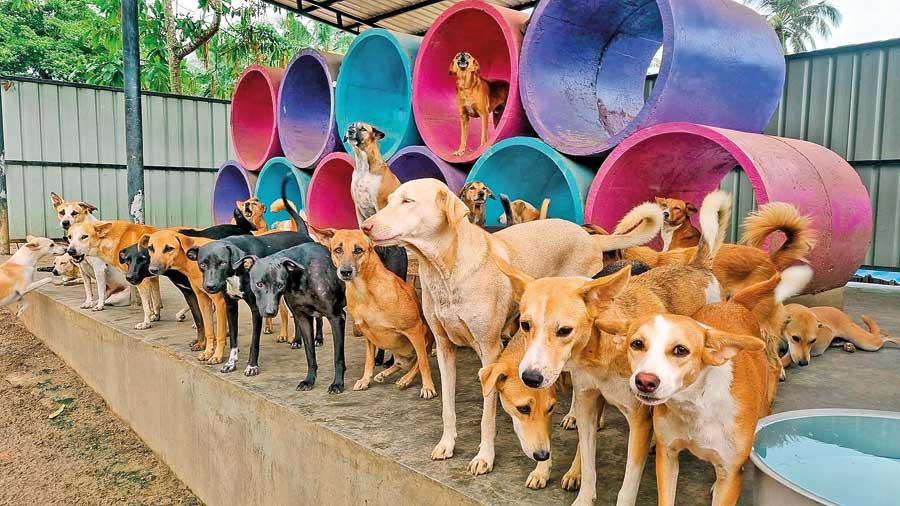22 Mar 2023 - {{hitsCtrl.values.hits}}
Amidst the economic turmoil, more and more people are abandoning pets, increasing the street animal population

Volunteering at an animal welfare organisation or shelter is also a great way to help! (Animal SOS)
Abandoning puppies and kittens in boxes isn’t a novel phenomenon and it isn’t unique to Sri Lanka either. However, the number of pets being abandoned has increased recently. With the prices of food and essentials skyrocketing and an increasing number of migrations out of the country, many pets are losing their homes and are left to brave the streets. There are approximately three million street animals in Sri Lanka. On average, the life expectancy of a street animal is half the life expectancy of a pet dog or cat due to cases of malnutrition, disease and exposure to dangers posed by both humans and other animals.
prices of food and essentials skyrocketing and an increasing number of migrations out of the country, many pets are losing their homes and are left to brave the streets. There are approximately three million street animals in Sri Lanka. On average, the life expectancy of a street animal is half the life expectancy of a pet dog or cat due to cases of malnutrition, disease and exposure to dangers posed by both humans and other animals.
How are animal welfare organisations and shelters coping?
The rise in abandoned pets and reluctance to adopt animals due to the rising cost of upkeep has led to many shelters and animal welfare organisations operating at capacity.
“We have had so many dogs and cats left at our door or thrown over the walls of our shelters,” said Shiona Weerasekara, Secretary of the Animal Welfare and Protection Association (AWPA).
“There have been dogs whose front legs have broken after being thrown over the wall,” she said.
The AWPA operates two ‘No kill’ shelters: One in Dehiwala and the other in Kahathuduwa, looking after more than 400 dogs and 65 cats.
Animal SOS Sri Lanka, which operates a ‘No kill’ sanctuary in Ahangama, is also experiencing a rise in the number of shelter animals and is currently caring for over 2,100 animals, including 500 disabled animals.
“The number of inquiries we are receiving, especially regarding rescue and abuse cases, has been on the rise,” said Animal SOS representative Amal Pathirana.
Embark representative Steve Ponnambalam also noted the increase in returned dogs as well as the reduction in adoptions. “We are getting so many calls from people who have adopted dogs from us because they are either migrating or have lost their jobs and can no longer afford to care for their dogs, even though they want to,” Ponnambalam said.
“It is a very sad situation. Ideally, people should find a way to take their dogs with them or at least have someone who the dogs are familiar with, take care of them. We have also seen an increase in the number of pets left on the streets, both local breeds and pedigree dogs,” he added.
“Previously, we used to have around 15 adoptions per adoption day. Now, it averages at a maximum of only 4 to 5 adoptions per adoption day”.
Representatives from all three organisations commented on the fall in donations from locals as well as their rising costs of operations, mainly regarding food, medicines, vaccines, shelter overheads and cleaning supplies.
What role do breeders play?
When asked about breeders and their links to the street animal population, all three representatives commented on the dangerous ways in which many businesses in the breeding industry operate.
A common concern was the extreme overuse of pure breed animals for breeding purposes, after which the mother and father are often abandoned on the road.
“Pure breed dogs also require a lot more care and are more difficult to maintain. Some people don’t realise this and, as time passes, keeping the dog becomes a financial strain. This leads to many of these dogs needing to be re-homed, and in worse cases, they are deserted,” Ponnambalam of Embark said.
According to Weerasekara of the AWPA, there is a belief that pedigreed or pure bred animals are preferred to local animals because they are viewed as status symbols.
“Increased awareness of the breeding industry has made people’s mindset towards this change. Many pedigree pet owners are now adopting local animals as well and donating to our organisation so we can care for as many animals as possible,” she said. “If you would like a dog, you don’t need to buy a purebred puppy. Our local Sri Lankan dogs are amazing. They’re loyal, intelligent, very brave and they’re interesting!” she added.
The Animal Welfare Bill: a beacon of hope
A longstanding aim of activists and animal lovers, the Animal Welfare Bill seems to be making gains. A Ministerial-level meeting is set to be held next week to discuss the Bill, according to the Parliament’s Media Division.
Including sections on the abandonment of animals, willfully depriving animals of food and water, as well as regulations on pet shops, the Bill has the potential to significantly better the treatment of animals in the country, including the street animal population.
The Bill also sets out the ability for individuals and groups to directly file an action for complaints on animal cruelty, a right which was previously held only by the police.
“After the Bill is hopefully passed, we need to create awareness about it so that people are educated on the proper, legal ways to treat animals. The Bill will also make the punishments for animal cruelty more severe, which should reduce the mistreatment of animals,” said Pathirana of Animal SOS Sri Lanka.
Community responsibility
What can we as a community do to reduce the street animal population?
The three representatives had complementary ideas:
1. Sterilisation. "Neutering is one of the most humane ways of limiting the growth of the street animal population. Many people still have the 'one litter' concept but this is not really accurate. Sterilisation also has a number of health benefits. If you are a pet owner, take your pet to a vet and get them sterilised. You can even help with doing this for street animals in your area", the representatives said.
2. Vaccinations and feeding. "If you are willing and able to, feed and vaccinate the street animals in your area so that the animals on the street are healthy".
3. Donating, adopting and volunteering. "If you are able and willing, donate to animal welfare organisations and adopt a pet, rather than buying one. Volunteering at an animal welfare organisation or shelter is also a great way to help!".
Organisations featured: AWPA: awpasl.org Embark, embarkpassion.com, Animal SOS Sri Lanka: animalsos-sl.com
10 Jan 2025 59 minute ago
10 Jan 2025 2 hours ago
10 Jan 2025 4 hours ago
10 Jan 2025 4 hours ago
10 Jan 2025 4 hours ago